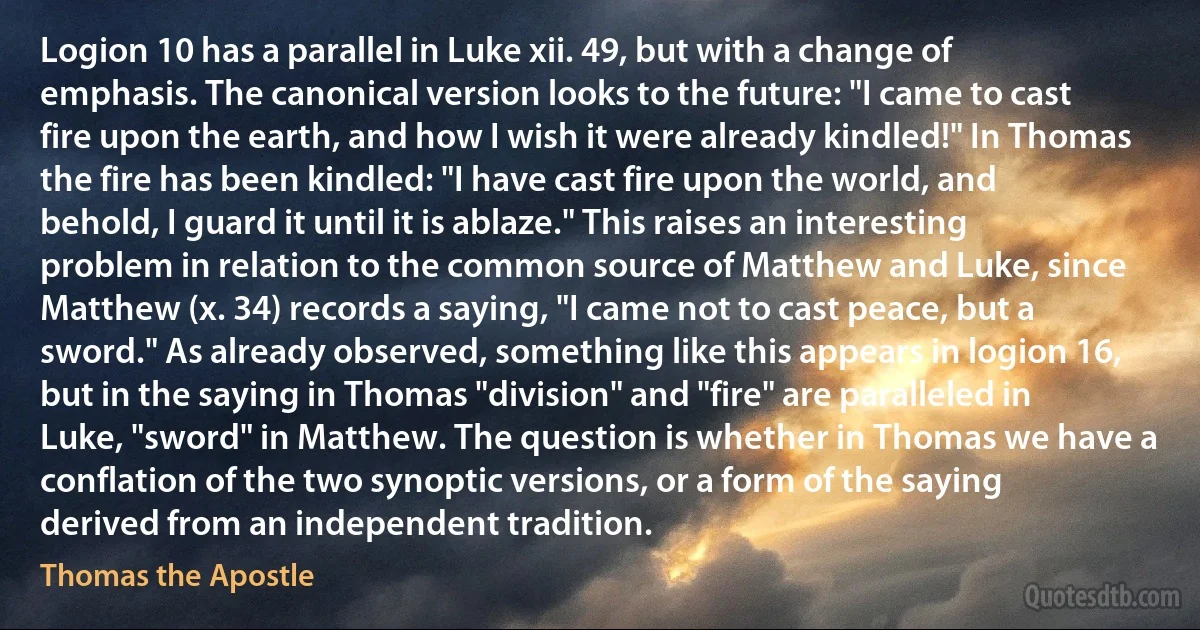
Logion 10 has a parallel in Luke xii. 49, but with a change of emphasis. The canonical version looks to the future: "I came to cast fire upon the earth, and how I wish it were already kindled!" In Thomas the fire has been kindled: "I have cast fire upon the world, and behold, I guard it until it is ablaze." This raises an interesting problem in relation to the common source of Matthew and Luke, since Matthew (x. 34) records a saying, "I came not to cast peace, but a sword." As already observed, something like this appears in logion 16, but in the saying in Thomas "division" and "fire" are paralleled in Luke, "sword" in Matthew. The question is whether in Thomas we have a conflation of the two synoptic versions, or a form of the saying derived from an independent tradition.
Thomas the ApostleRelated topics
came cast change common earth emphasis fire form future guard luke parallel peace problem question saying something source sword version wish world canonical looksRelated quotes
Our questions and answers are in part determined by the historical tradition in which we find ourselves. We apprehend truth from our own source within the historical tradition.
The content of our truth depends upon our appropriating the historical foundation. Our own power of generation lies in the rebirth of what has been handed down to us. If we do not wish to slip back, nothing must be forgotten; but if philosophising is to be genuine our thoughts must arise from our own source. Hence all appropriation of tradition proceeds from the intentness of our own life. The more determinedly I exist, as myself, within the conditions of the time, the more clearly I shall hear the language of the past, the nearer I shall feel the glow of its life.

Karl Jaspers
I would dramatically reduce the safeguards for software - from the ordinary term of 95 years to an initial term of 5 years, renewable once. And I would extend that government-backed protection only if the author submitted a duplicate of the source code to be held in escrow while the work was protected. Once the copyright expired, that escrowed version would be publicly available from the copyright office.
Most programmers should like this change. No code lives for 10 years, and getting access to the source code of even orphaned software projects would benefit all. More important, it would unlock the knowledge built into this protected code for others to build upon as they see fit. Software would thus be like every other creative work - open for others to see and to learn from.

Lawrence Lessig
What was the origin of our slave population? The evil commenced when we were in our Colonial state, but acts were passed by our Colonial Legislature, prohibiting the importation, of more slaves, into the Colony. These were rejected by the Crown. We declared our independence, and the prohibition of a further importation was among the first acts of state sovereignty. Virginia was the first state which instructed her delegates to declare the colonies independent. She braved all dangers. From Quebec to Boston, and from Boston to Savannah, Virginia shed the blood of her sons. No imputation then can be cast upon her in this matter. She did all that was in her power to do, to prevent the extension of slavery, and to mitigate its evils.

James Monroe
God himself must have either written or dictated to Adam the events of chapter 1. Adam then added chapters 2-4 to the record and passed it on to one of his descendants, presumably on clay tablets baked or dried into pottery. Noah would have carried the sacred records on the ark. Noah and his sons would have been eyewitnesses to the events in Genesis 5:11 - 10:32. Shem must have written the last part (chapters 10:1-11:10) and given the responsibility of keeping the records to his great-great-great-great-great-great-grandson Terah, whom he outlived by 70 years! Evidently Moses, being raised in Egypt to be a pharaoh and having access to the best libraries and records, came into possession of the records or a copy of them, and was the inspired editor to put the records into their final form the book of Genesis.

Kent Hovind
The foundation of all religion is the belief in a God, and that He exists in certain relation with His creatures. Such belief necessarily leads to the consciousness of some obligation towards the Deity ; and this consciousness suggests the duty of worship ; and in the selection of the form of this worship originates the various creeds which distinguish and distract mankind. There is a sort of geography of religion ; and I regret to think that the majority of mankind take their creed from the clime in which they happen to be born ; and that many, and not an inconsiderable portion of mankind, suffer the sacred torch to burn out altogether, in their contact with the world, and then vainly imagine that they can recover the sacred fire by striking a park out of dogmatic theology.

Charles Babbage
